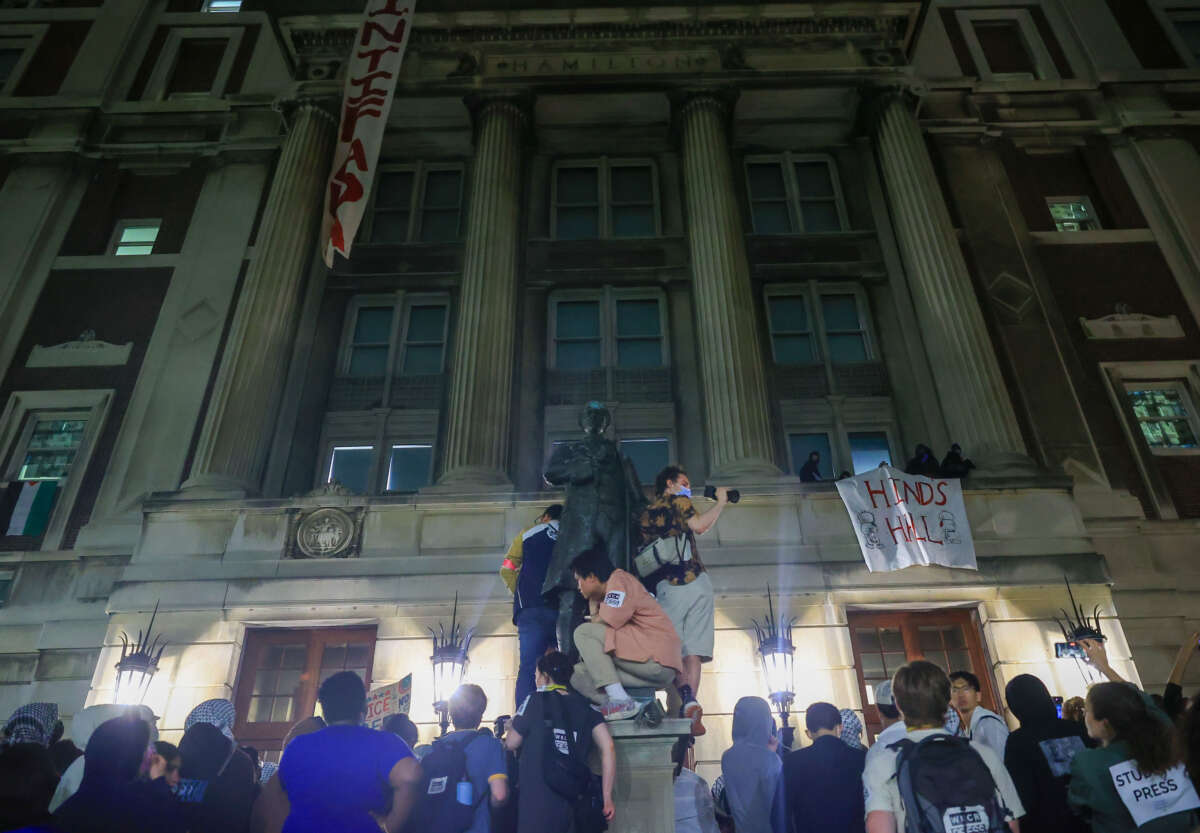Columbia University’s pro-Palestine protesters took over a building on campus, known as Hamilton Hall, early on Tuesday morning, after university administrators threatened students in a solidarity encampment and said that the university “will not divest from Israel” in a statement on Monday.
Students occupying the building have dubbed the building “Hind’s Hall” after Hind Rajab, a 6-year-old girl who was killed by Israeli troops in Gaza. Shortly before Hind’s death, she was recorded desperately pleading for help in a three-hour phone call after Israeli soldiers had opened fire on a car carrying her family, leaving her the sole survivor. Her body was later found decomposing in the vehicle, while the bodies of two medics were found meters away in a charred ambulance that appeared to have been fired at by Israeli tanks.
Protesters rushed into the building shortly after midnight and locked it down, barricading and zip-tying doors and hanging banners from the building.
They have said that they will remain in the building until the university concedes to the movement’s three demands: divestment from Israel, disclosure of investments and assets across the university’s finances, and amnesty for students who have been suspended or otherwise punished by the university for protesting.
Over 100 students were arrested during the first week of their protest, and on Monday the university threatened students with more punitive action if they remained in the encampment, noting that it has been surveilling and identifying students.
The student’s occupation represents an escalation in tactics after the university stated its refusal to divest from Israel and negotiations broke down, with the university reportedly threatening to call in the National Guard; notably, the last time a university called the National Guard on student protesters, guardsmen massacred students in broad daylight.
According to Columbia University Apartheid Divest (CUAD), the university has unleashed a barrage of threats on the protesters, including a mass-lockdown and eviction that would leave many students homeless and without access to food halls. The threats, as well as the violent police repression of Columbia’s and other student protests across the country, left organizers with no choice but to raise the stakes, the group said.
“This university repeatedly endangers its students by instituting a police state with military-style checkpoints, repressing and isolating students on campus, calling armed riot cops for the largest mass arrests on campus since 1968, and weaponizing food insecurity and houselessness as leverage in negotiations,” said CUAD in a statement on Tuesday.
“Columbia has forced protestors to escalate by contributing to a genocide while refusing to follow baseline standards of conduct that make negotiation possible,” the group continued.
Hamilton Hall has been occupied several times by anti-war and anti-occupation protesters in its history, including during protests against the Vietnam War and South African apartheid, among other issues.
Columbia students’ protest has inspired protesters on at least 120 other campuses, with over 1,200 protesters arrested across the country so far, according to a count by The Washington Post. As Columbia was threatening students on Monday, the University of Texas, Austin was sanctioning police to use chemical and physical weapons against its own students, with dozens, if not hundreds of police descending on students on campus, making dozens of arrests.
Press freedom is under attack
As Trump cracks down on political speech, independent media is increasingly necessary.
Truthout produces reporting you won’t see in the mainstream: journalism from the frontlines of global conflict, interviews with grassroots movement leaders, high-quality legal analysis and more.
Our work is possible thanks to reader support. Help Truthout catalyze change and social justice — make a tax-deductible monthly or one-time donation today.
